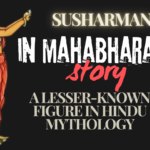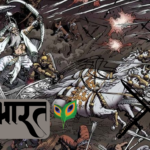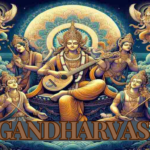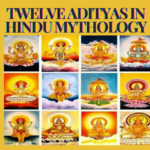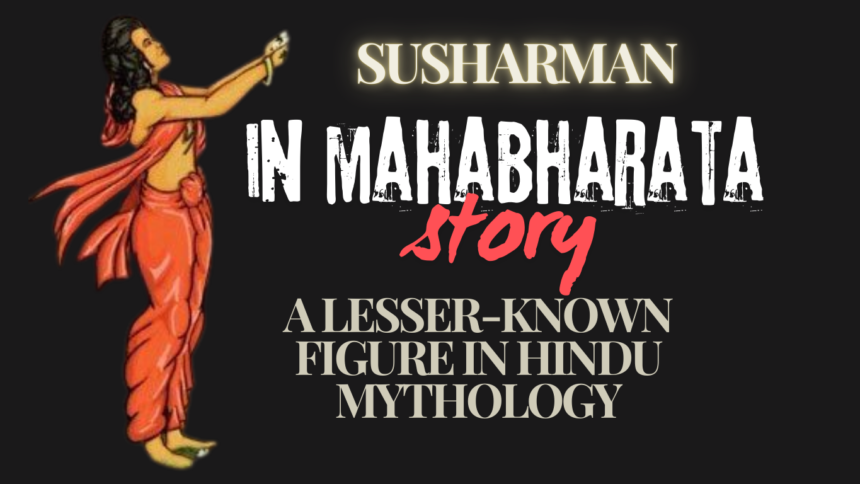In the rich tapestry of Hindu mythology, there are countless characters and stories that have been passed down through generations. Some of these characters are well-known, like Krishna, Rama, and Shiva, while others remain lesser-known but equally significant. Susarman is one such character whose story, though not as widely celebrated, plays a vital role in the grand narrative of Hindu lore. Susarman’s tale is a fascinating mix of valor, ambition, conflict, and ultimate realization, offering profound insights into the ancient world’s values, beliefs, and cosmic laws.
The Origins of Susarman.
Susarman, also spelled as Susharman, is a relatively obscure but interesting figure in Hindu mythology. According to various scriptures, he is often depicted as a warrior king, deeply entangled in the political and spiritual struggles of his time. Susarman is mentioned in several Puranas and epics, including the Mahabharata, where he is the king of the Trigarta kingdom. The Trigartas were a powerful tribe located in the northern part of India, and Susarman was a significant ruler of this region. His kingdom was situated near the modern-day state of Himachal Pradesh, known for its fierce warriors and strategic location.
Susarman in the Mahabharata: A Warrior King.
The Mahabharata, one of the greatest epics of Hindu mythology, provides the most detailed account of Susarman. He is depicted as a fierce adversary of the Pandavas, particularly Arjuna. Susarman, along with his brothers, was an ally of the Kauravas, the cousins and arch-rivals of the Pandavas. During the great Kurukshetra war, Susarman played a significant role in the military campaigns and strategies aimed at defeating the Pandavas.
Susarman’s enmity with the Pandavas began much earlier, stemming from a series of skirmishes and conflicts that involved cattle raids and territorial disputes. The Trigartas, under Susarman’s leadership, were known for their valor and strategic warfare tactics. They often conducted raids on the territories of the Pandavas, especially during their period of exile in the forest. These raids were primarily aimed at weakening the Pandavas’ morale and resources. Susarman, motivated by his loyalty to Duryodhana, the leader of the Kauravas, and his ambition to expand his kingdom, saw the Pandavas as a direct threat to his power and prestige.
The Role of Susarman in the Kurukshetra War.
During the Kurukshetra War, Susarman’s role was crucial in several battles. On the twelfth day of the war, he led the Samsaptakas, a group of warriors who had taken a vow to fight until death, against Arjuna. The Samsaptakas were infamous for their reckless bravery and fierce determination. Susarman, as their leader, was determined to either kill Arjuna or die in battle. This vow made them a formidable force on the battlefield, and they relentlessly pursued Arjuna, trying to divert him from the main battlefront.
Despite his courage and strategic acumen, Susarman was repeatedly defeated by Arjuna, who was not only a superior warrior but also favored by the gods. Susarman’s tenacity, however, did not wane, and he continued to fight with undying spirit. His participation in the war is significant not just for his direct confrontations with Arjuna, but also for the broader strategic implications his actions had on the course of the war. His repeated engagements with Arjuna often diverted the latter’s attention, affecting the overall battle dynamics and strategies of the Pandavas.
The Significance of Susarman’s Character in Hindu Mythology.
Susarman’s story is more than just a tale of a warrior king; it is a reflection of the larger themes of dharma (duty) and karma (action) that are central to Hindu philosophy. Despite being on the side of the Kauravas, who are often depicted as the antagonists in the Mahabharata, Susarman is portrayed with a sense of dignity and valor. His loyalty to his allies, his commitment to his duties as a king, and his courage on the battlefield are emphasized throughout the texts.
In many ways, Susarman embodies the complexity of the human condition, where duty and morality are often at odds. He is not a villain in the traditional sense; instead, he is a tragic hero, driven by his circumstances, his loyalties, and his ambitions. His story serves as a reminder that the epic is not just a battle between good and evil, but a complex narrative where every character has a role to play in the cosmic order.
Susarman’s Transformation and Redemption.
Towards the latter part of his life, Susarman undergoes a significant transformation. After the conclusion of the war, and witnessing the immense loss of life and the futility of the conflict, Susarman is said to have experienced a change of heart. This transformation is symbolic of the larger theme of moksha (liberation) that runs through Hindu mythology. Realizing the transient nature of power and glory, Susarman is believed to have renounced his kingdom and wealth, seeking solace in a life of spirituality and penance. His journey from a fierce warrior to a seeker of truth highlights the profound belief in Hinduism that every soul, regardless of its past actions, has the potential for redemption and enlightenment.
The Legacy of Susarman: A Reflection on Hindu Values.
The legacy of Susarman in Hindu mythology is multifaceted. On one hand, he is remembered as a valiant king who fought bravely for his allies, and on the other, he is a symbol of the realization of the ultimate truth — that material wealth, power, and earthly pursuits are impermanent. His story encourages introspection into the deeper meanings of duty, loyalty, ambition, and spiritual realization.
Though Susarman does not occupy a central position like other mythological figures, his tale adds to the richness and diversity of Hindu lore. It reflects the ancient Indian values of courage, loyalty, and the quest for spiritual understanding. Susarman’s story, therefore, serves as an important lesson for humanity, reminding us of the complexities of life, the conflicts between duty and morality, and the ultimate pursuit of spiritual truth.
Susarman’s Role in the Eternal Mythological Narrative.
Susarman may not be the most celebrated figure in Hindu mythology, but his story is crucial in understanding the broader themes that define the epic narratives of ancient India. His life exemplifies the valor and complexity of a warrior king torn between his duties and his spiritual awakening. As we delve deeper into the tales of the Mahabharata and other Hindu scriptures, characters like Susarman provide us with a richer understanding of the values, struggles, and beliefs of ancient Indian society.
